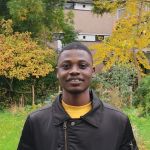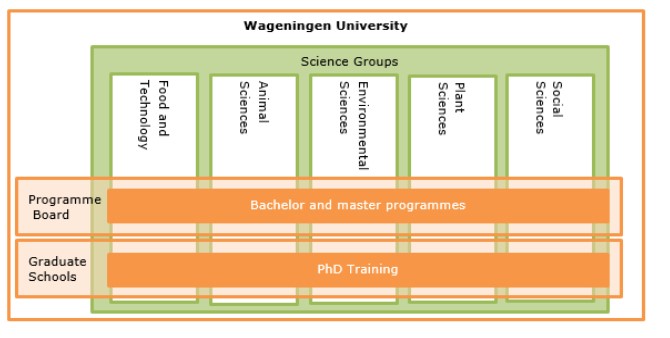How is WUR organised: chair groups and research institutes
As a prospective student, you may be wondering, ‘how is Wageningen University & Research organised?’ or ‘what will be my future ‘department’ at WUR?’. WUR is a bit different from other universities, hence it might be slightly confusing if you are not in WUR. In this blog, I will share with you the organisation of WUR. I hope you will be able to figure out what your potential ‘department(s)’ are after reading it. ?
Structure of Wageningen University & Research?
Wageningen University is fundamentally a research-oriented university with the Wageningen University (education) and the research institutes (Wageningen Research-WR). Wageningen University comprises 1 faculty with 5 Science groups (also known as departments). These Science groups are Agrotechnology and Food Sciences, Animal Sciences, Environmental Sciences, Plant Sciences and Social Sciences.
All these Science groups are responsible for the management of the activities of Chair Groups and the research institute aspect (WR) of the university. Since the WR is not directly involved in teaching at WUR, I will focus on the chair groups. Some chair groups are usually clustered according to similarities under the broad field of a particular science group.
A chair group is ‘the smallest organisational component within Wageningen University in which academic teaching and research is given shape and societal value is created in a specific field’. Generally, there are about 90 chair groups with each of them led by a Professor to conduct research in their own domain. Despite the exclusiveness of every chair group, they all work under the thematic area of healthy food and living environment.
How chair groups engage in education?
The key question then is how do these groups engage in education at WUR. At WUR, it is the science groups that technically deliver education, through the chair groups. This happens as and when they are requested by the programme board. Unlike other universities where departments are usually exclusive to programmes, the department (science group) has a broader connotation at WUR.
This comprised of several chair groups that deliver education within a programme(s) at Wageningen. Also, one chair group could be involved in the education of more than one programme. The involvement of chair groups in a programme is evident in the courses and also the specialisation (thesis tracks).
Practically, the programme committee (comprises of students, teachers and programme team) negotiate with the chair group(s) on whether new courses and specialisations are needed or existing courses or thesis specialisations have to be enhanced.
Let’s figure one out together:
I will use my study programme MSc Urban Environmental Management (MUE) and chair group of Landscape Architecture and Spatial Planning (LSP) where I belong as an example. The LSP has two divisions. These are the Landscape Architecture and Spatial Planning (Land Use Planning) aspects. From the Science group webpage, we can find LSP under the Environmental Sciences department (Science group).
The LSP delivers education mainly in one bachelor’s programme (Landscape Architecture and Spatial Planning) and two masters’ programmes: Master Landscape Architecture and Spatial Planning and the MUE. With especially the MUE, Land Use Planning is among the many other chair groups (some from the social science department) that deliver education in the study programme.
Within your Programme
Drifting from the LSP example to the broad Master Urban Environment Management programme. There is an Environmental Policy specialisation whose courses and thesis are delivered or managed by the Environmental Policy (ENP) chair group. The ENP also delivers education both in the bachelor’s and Master’s Environmental Sciences. This gives students the space to take a free choice course(s) from chair groups which are not necessarily within their thesis track.
Nevertheless, you can also take free choice course(s) from chair groups which are not involved in your study programme. There is also a possibility of writing your master’s thesis in 2 chair groups. This flexibility in the WUR structure helps students to tailor their own programmes to meet their individual needs. It is hardly the case for 2 students within the same study programme to have the exact same study plan (courses).
Therefore, several chair groups deliver education within the MUE programme.
We hardly use ‘Department’ in our daily discourse at WUR especially if you are a student. Based on the specialisation or thesis track, we normally mention our chair group. The word department is a much broader term in WUR than it is in other universities. Hence, most people relate to the term chair group than ‘department’. I hope you have learned something new about WUR today??
Stay glued to our blog posts, and sign up for our newsletters since we have exciting blogs coming up.


